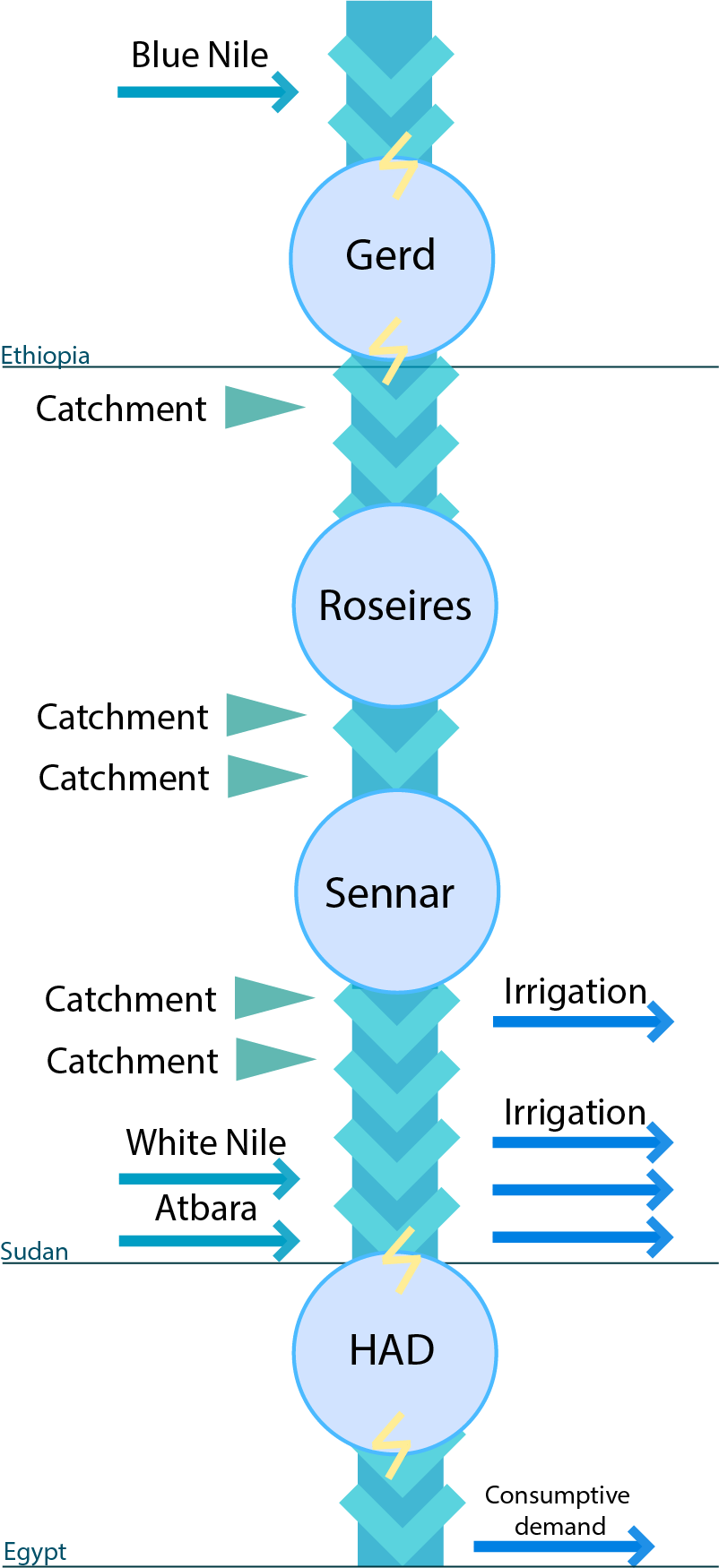Nile¶
The Nile River is a critical resource in northeastern Africa, serving as a water source for hydropower, agriculture, and domestic use across multiple nations. Water rights issues, particularly between Egypt, Sudan, and Ethiopia, have intensified with Ethiopia’s construction of the Grand Ethiopian Renaissance Dam (GERD), intended for hydropower generation to boost its economic development.
Originally, the simulation starts at (2025, 1, 1) and the decisions are taken on a monthly basis over a 20-year period, resulting in 240 time steps for each episode. It also has 4 following objectives, we provide reference points for each for hypervolume calculation:
Ethiopia power (max), ref point: 0.0
Sudan deficit (min), ref point: -240
Egypt deficit (min), ref point: -240
HAD minimum level (max), ref point 0.0
Where max/main signifies whether an objective is to be maximised or minimised. The reference point is used for calculating hypervolume as the worst case scenario in terms of acquired rewards by the agent at the end of the simulation.
Where in all cases:
Observation space: Storage in 4 reservoirs, month (5 dimensions)
Action space: Release per each reservoir (4 dimensions)
Here you can see a picture visualising Nile river structure:

Running Nile¶
import mo_gymnasium
import morl4water.examples
water_management_system = mo_gymnasium.make('nile-v0')
def run():
#reset
obs, info = water_management_system.reset()
print(f'Initial Obs: {obs}')
final_truncated = False
final_terminated = False
for t in range(10):
if not final_terminated and not final_truncated:
action = water_management_system.action_space.sample()
print(f'Action for month: {t}: {action}')
(
final_observation,
final_reward,
final_terminated,
final_truncated,
final_info
) = water_management_system.step(action)
# print(f'Final final_info: ', final_info)
print(f'Observation: {final_observation}')
print(f'Reward: {final_reward}')
else:
break
return final_observation
run()
Taken from: Sari, Y. (2022). Exploring Trade-offs in Reservoir Operations through Many-Objective Optimization: Case of the Nile River Basin (Master’s thesis). Delft University of Technology.
Data & Data Sources¶
Data |
Facility |
Value |
Source |
|---|---|---|---|
inflow |
Catchments in Sudan |
Monthly time series |
Stochastic data generated by Wheeler et al. (2016) |
efficiency |
GERD Power Plant |
93% |
Abdelazim et al. (2020) |
head start level |
GERD Power Plant |
507 m |
Eldardiry and Hossain (2021) |
max capacity |
GERD Power Plant |
6000 MW |
Wheeler et al. (2016) |
max turbine flow |
GERD Power Plant |
4320 m |
Abdelazim et al. (2020) |
min turbine flow |
GERD Power Plant |
0 m |
Yasin (2022) |
n_turbines |
GERD Power Plant |
1 |
Wheeler et al. (2016) |
initial storage |
GERD reservoir |
15BCM |
Barnes (2022) |
max capacity |
GERD reservoir |
117.5BCM |
Barnes (2022) |
max release |
GERD reservoir |
10000 m³/s |
Yasin (2022) |
evaporation rate |
GERD, Sennar, Roseires and HAD reservoirs |
Monthly time series |
Wheeler et al. (2016) |
efficiency |
HAD Power Plant |
90% |
Yasin (2022) |
head start level |
HAD Power Plant |
147 m |
Wheeler et al. (2016) |
max capacity |
HAD Power Plant |
2100 MW |
Wheeler et al. (2016) |
min turbine flow |
HAD Power Plant |
0 m |
Wheeler et al. (2016) |
n_turbines |
HAD Power Plant |
1 |
Wheeler et al. (2016) |
initial storage |
HAD reservoir |
137BCM |
Yasin (2022) |
max capacity |
HAD reservoir |
182.7BCM |
Wheeler et al. (2016) |
max release |
HAD reservoir |
7000 m³/s |
Yasin (2022) |
max turbine flow |
HAD Power Plant |
4211 m |
Wheeler et al. (2016) |
water demand |
Irrigation districts |
Monthly time series |
Yasin (2022), based on population growth and historical data |
initial storage |
Roseires reservoir |
4.57BCM |
Yasin (2022) |
max capacity |
Roseires reservoir |
6.1BCM |
Wheeler et al. (2016) |
max release |
Roseires reservoir |
15000 m³/s |
Yasin (2022) |
initial storage |
Sennar reservoir |
0.43BCM |
Yasin (2022) |
max capacity |
Sennar reservoir |
0.6BCM |
Wheeler et al. (2016) |
max release |
Sennar reservoir |
7000 m³/s |
Yasin (2022) |
storage to level to surface relationship |
Sennar, GERD, Roseires, HAD reservoirs |
Tabular data |
Wheeler et al. (2016) |
storage to min max release |
Sennar, GERD, Roseires, HAD reservoirs |
Tabular data |
Wheeler et al. (2016) |
inflow |
White Nile, Atbara, Blue Nile |
Monthly time series |
Data generated by Yasin (2022) based on historical data gathered by Eldardiry and Hossain (2021) |